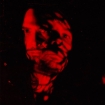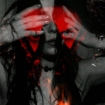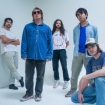VOWWS usually perform in near darkness, with the only light coming from a movie projector aimed at the stage. The Australian duo — singer-guitarist Matt James and singer-keyboardist Rizz — mostly play bent over their instruments in dark glasses and long black coats, crafting their brooding, deeply melodic "death pop" from the shadows.
The scene was very different, however, when VOWWS recently appeared as the first of a long lineup of bands opening for the Cult — the group's frontman Ian Astbury is a fan. Instead of shrouded in gloom, they found themselves performing in the bright L.A. sunshine at 6,000-capacity outdoor venue the Greek Theatre. VOWWS persevered, unfazed. During "The Great Sun," Rizz — her forehead painted into an imposing, vampiric widow's peak — even stepped out from behind her synths to sing into a handheld trucker's mic (a trick lifted from Mike Patton). It was a confident move, one that suggested a vocalist getting more comfortable in the glare of the spotlight.
Rizz may have to get used to it there, because the spotlight has found her band, swung its way by a host of big-name supporters: not just Astbury, but also Deftones singer Chino Moreno and New Wave godfather Gary Numan, both of whom have collaborated with the duo. Fiercely independent and not inclined to compromise creatively, VOWWS are nonetheless poised to seize their moment, being well equipped with the musical tools and understanding to do so. "A melody can be like a drug. It can trigger emotions if you make the right turns," Rizz reflects. "Just take people on a journey, maybe somewhere a little sentimental, a little dramatic."
VOWWS' sound and vision are part of a long musical tradition of bleakness and light, of Gothic décor and synthetic sounds, but the two Australians came to it unknowingly, they insist. "We didn't listen to a lot of Eighties music. We didn't really listen to darkwave or things like Sisters of Mercy," says Rizz. "We were just dorks who like playing surf rock, trying to be tricky. All this cool synth music? We had never heard of it."
A few days after the concert, Rizz is smoking on the balcony of the Los Angeles sublease she shares with James, which is walking distance to the Hollywood Bowl. Musical instruments and computers are strewn around its rooms, suggesting works in progress, but few personal decorations signify a permanent home.
At the moment, James is out mailing records to fans and running other errands, avoiding another interview session. "He has no ego," says Rizz. "He's just a quiet overachiever. Even in college, he was in nine bands because everyone wanted him in their band."
VOWWS are hard at work writing their next collection, gathering at least 50 demos, song ideas and fragments, aiming for a release late this year or early 2020. The stakes have grown larger as their profile rises in the wake of VOWWS' first-ever tour of Europe and the unexpected attention from established artists.
Last year, and out of nowhere, Moreno tweeted out a link to one of VOWWS' songs, "Symbol System." Then Rizz heard that during a radio interview the Deftones singer had listed them among his favorite bands of the moment. "I was like, that's amazing. How does he even know about us?" A mutual friend suggested a collaboration to Moreno. That ultimately led to the remix "Structure of Love II" earlier this year, produced with Danny Lohner, a.k.a Renhölder, with a soaring Moreno vocal chorus: "I can't get you out of my mind/Your love is so hard to define."
"Growing up, Deftones was all I listened to for a while because I got into nu-metal," says Rizz. "There's something about Deftones that was unique and had more heart. It wasn't so Hot Topic."
In 2015, there was also a collaboration with Gary Numan, the pioneering maker of abrasive, pulsating electro-pop, whose work in the Seventies and Eighties was a central influence on a teenage Trent Reznor. VOWWS wrote "Losing Myself in You" with Numan in mind. "These cool rock-star dudes want to help us out," says Rizz with a smile. "I don't think it's charity. I feel like they're probably like, 'This is cool music!'"
For Rizz, the obsessions with darker sounds and pictures began during early childhood. Born in Costa Rica to Iranian parents, her family emigrated to Australia when she was three. She was raised on horror movies on TV, wading deep into the cinematic shadows and ultra-violence to escape the real horror of an abusive alcoholic father permanently on the dole. And as the daughter of Middle Eastern immigrants, she faced racial and cultural hatred from the locals.
"We grew up in dingy welfare houses in a very, very white suburban neighborhood in Australia, so I was picked on all the time: 'Go back to your own country' and 'Your food smells,' things that hurt your feelings," she recalls. "It wasn't fun and I would reject it for a while. I tried to fit in with Australians and wanted to lighten my hair and all that kind of stuff."
But her love of horror movies, and the hard rock she was fed by MTV, led to a gloomier creative path. She idolized the psychos of Killing Zoe and Cape Fear. She found musical solace within the emotional minimalism of Philip Glass and the soundtracks of John Barry ("Beat for Beatniks"), John Clifford White (Romper Stomper) and Elliot Goldenthal (Pet Sematary), and joy in the flinty New Wave pop of early INXS and Split Enz.

A decade ago, Rizz and James met at a music academy in Sydney, and she soon saw the rock band he'd had since high school perform "a shitty, shitty local gig" and was impressed. The band was called the Captain, a.k.a. the Captain's Package, and was more Talking Heads than anything approaching goth. "There was something about the melodies, and it was super experimental." Between smokes on her balcony, Rizz shares one of the group's songs on her iPhone, a Western-edged tune called "Anybody's Clown." She soon joined the band as keyboardist and the Captain traveled to Los Angeles to record a never-released album and dissolved. Rizz and Matt remained in the U.S. and, following a difficult brief time in New York and escape back in Australia, they established VOWWS in L.A.
After releasing one album, 2015's The Great Sun, on Cleopatra Records, VOWWS are happily DIY by choice and necessity, creating their own music videos and short films. On camera, Rizz often has black makeup smeared across her face, somehow resembling both the hero and the heroine from the 1920 silent classic The Cabinet of Dr. Caligari. "If I wasn't doing music I'd probably be in film because it's so enjoyable," she says.
They are already scoring movies and fashion shows: a performance at a Comme des Garcons show during Paris Fashion Week somehow got VOWWS mentioned by Vogue. Rizz is happy for the attention, but the music isn't meant to be fashionable. "It all comes from a real place," she notes. "As much as possible, I want to put the truth of something out there so that it resonates because people can smell it when it's fake."

The pain of the past is real, as is the ecstasy of transforming it into music and art. "I'm letting it out. I've never had therapy and stuff, which I am a candidate for, for sure. Growing up in an abusive environment, there's gotta be some weird shit going on. Instead this has become my therapy."
It's a way of life she's also put in writing in the form of a tattoo on her right wrist, lyrics from the Doors' "The Crystal Ship," which read: "The days are bright and filled with pain."
"That's the whole thing of just embracing your sadness and depression and not really trying to fight it and making it work for you," says Rizz. "The days are bright, and the pain is there, but it's not a bad thing."












